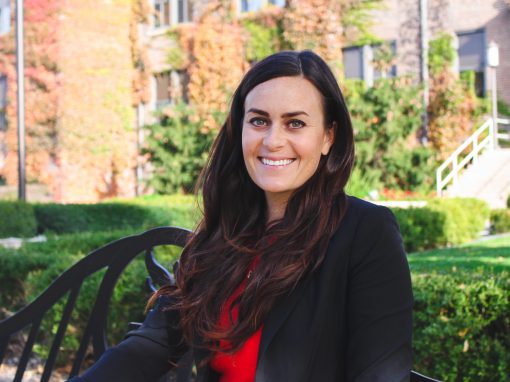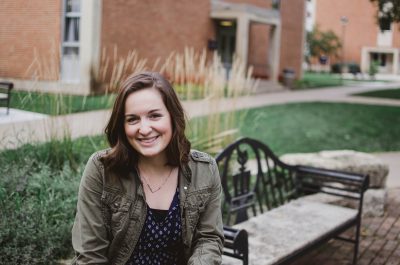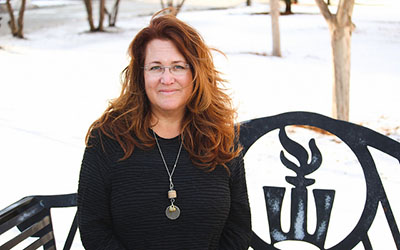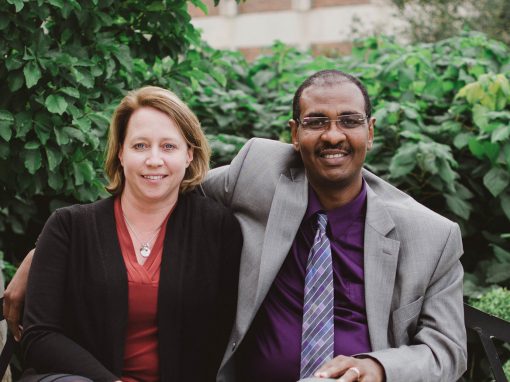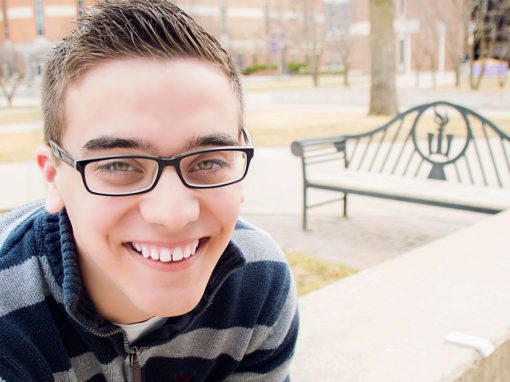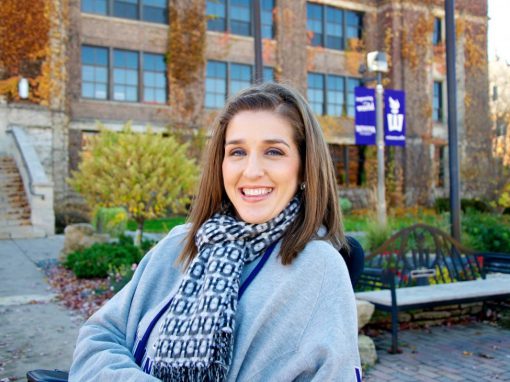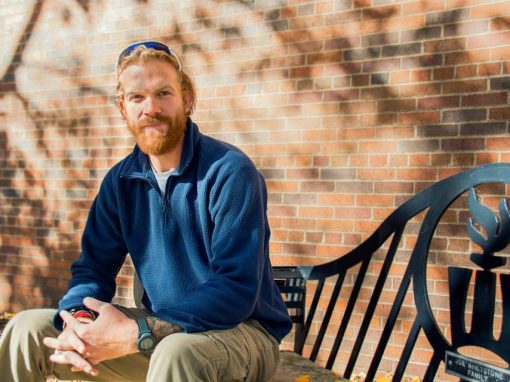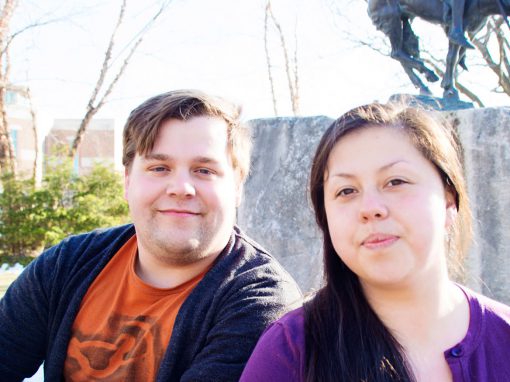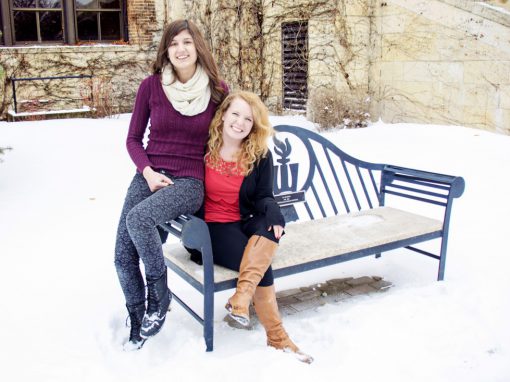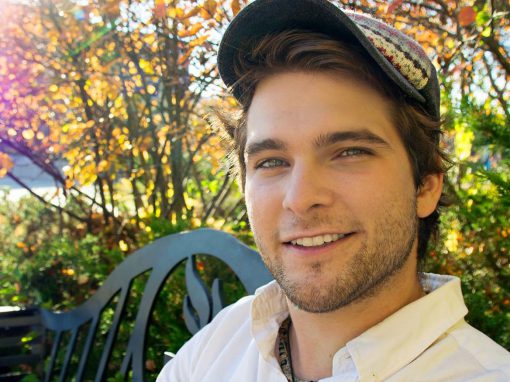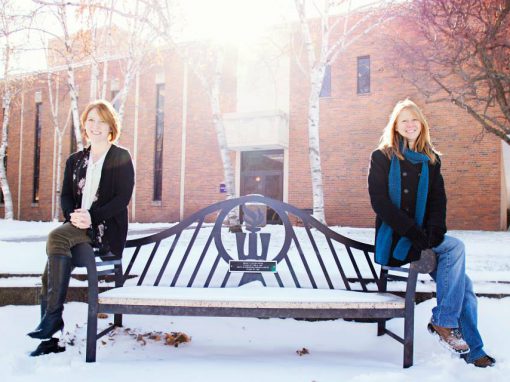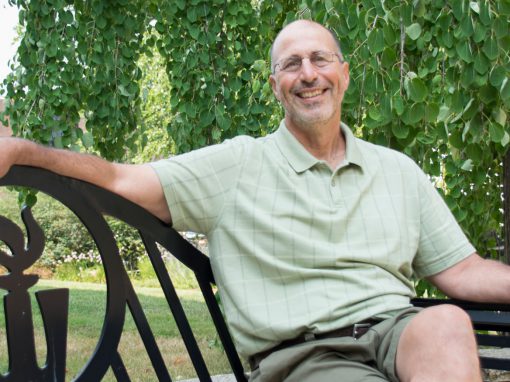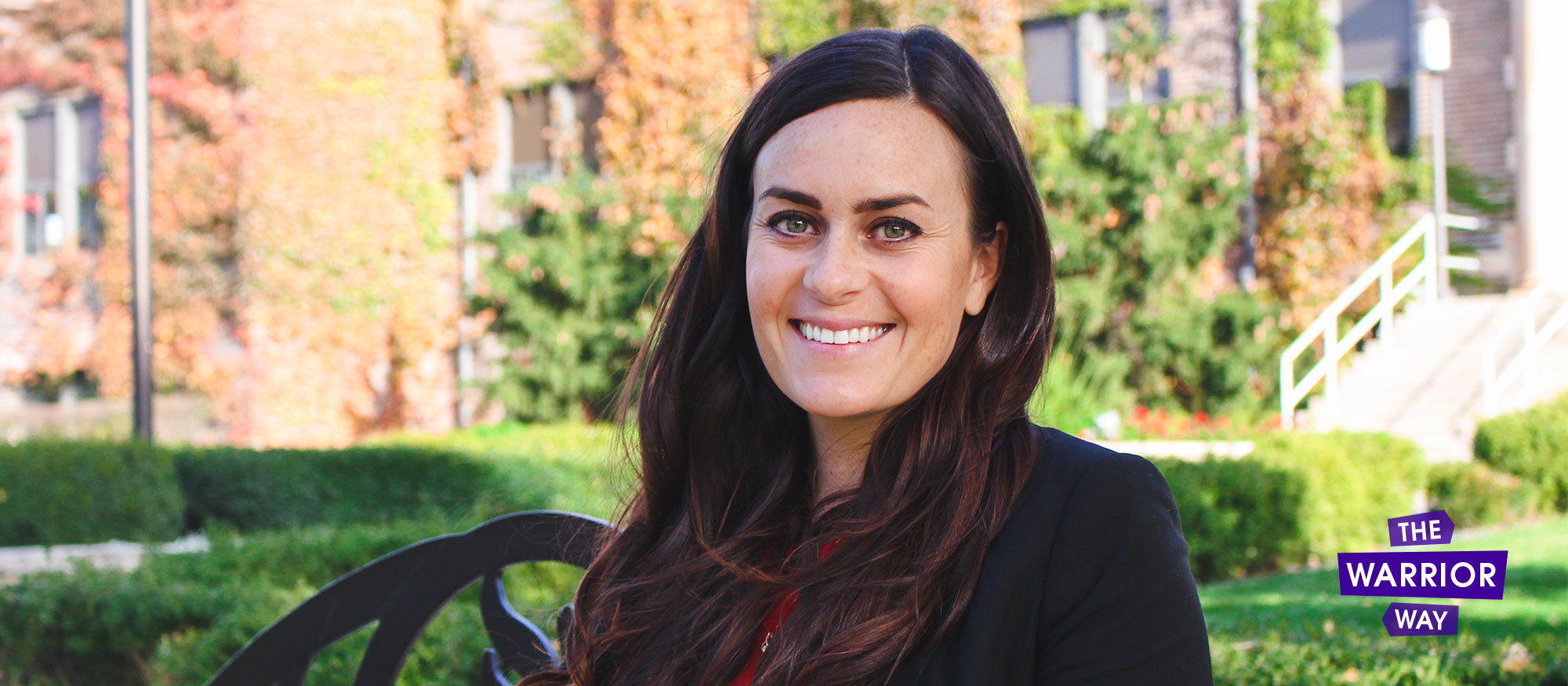
Rachel Schromen ’10 | An Empowering Voice for Women
Alumna from St. Paul, MN
Owner and Managing Attorney of Schromen Law, LLC and co-founder and Executive Director of Domestic Abuse Legal Advocacy Center, PSC
“The Women’s Studies program gave me a voice of my own. I took Women’s Studies 101 and it completely changed my path – I didn’t really have a passion until after I took that class.”
When asked where she finds motivation for her career as an attorney and executive director of a non-profit she co-founded, Rachel revealed immense inner strength that stemmed from her deep-rooted passion for helping other women.
There’s a clear thread that ties Rachel’s work providing pro bono legal advocacy to victims and survivors of domestic violence back to her own past, as a survivor of sexual assault and domestic violence. Finding the strength and courage to talk about her experience has been therapeutic and healing for Rachel. It was through Speak Out events, the support of professors and the Women’s Studies program at WSU that Rachel learned how powerful it was for her to share her story.
Today, Rachel is using her voice in a professional context as an attorney to advocate for domestic violence survivors, veterans, senior citizens and others whose voices might not otherwise be heard. She also pays homage to her mentors by helping empower the next generation of women as her mentors empowered her. Given Rachel’s compassion, openness, and courage to be vulnerable, it’s easy to imagine her advocating for her clients and mentoring other women with her empathetic, encouraging, and empowering voice.
What attracted you to volunteering with Wills for Heroes and Cancer Legal Care that offer services to veterans, first responders, and terminal cancer patients?
I started volunteering early in my law practice to gain experience and to give back. It is really beneficial for young attorneys because you can volunteer at free legal clinics even while you’re in law school. It’s incredibly beneficial because you have an attorney mentoring you and the community is getting free legal services.
I like giving back. My dad was a veteran and I have family members who served that are police officers so I felt passionate about serving that community. Also, I represent numerous cancer patients and people on hospice through Cancer Legal Care and in my private practice. Estate planning for these families help to provide so much peace of mind. One time I prepared a will for a gentleman in hospice and as I was leaving, he took my hand, thanked me and said, “I can really focus on the time with my daughters in the last few days.” He died four days later. That moment reconfirmed my dedication to helping others achieve peace of mind.
Why did you pursue a career as a lawyer?
When I was in high school, my teachers always encouraged me to become a lawyer. I think it had to do with the fact that I questioned a lot of things, and I could form arguments to make my point well. Law practice includes a lot of things that I was naturally good at such as writing and communication skills.
When I came to Winona, I said that I was pre-law but I really wasn’t sure. One day I was talking to Dr. April Herndon in her office and I told her that I was thinking about going into social work because I really wanted to help people. She said I would make a really good social worker for about a year but that she could tell I would burn out quick. Dr. Herndon pointed out all the ways that I could still help people and then some by being an attorney, plus she said that I had the drive, the intelligence, and the family support to go to law school. She was really the professor that convinced me to go to law school while I was teetering back and forth about what I wanted to do with my life.
Where do you think your drive to help people came from?
My parents–my mom in particular– really pushed me to volunteer when I was young. In high school, I would get awards every year because I’d volunteer at least 100 hours of volunteer service a year at the nursing home, the humane society, the arboretum, and so on. There has always been a give-back component for me. In Winona, I luckily got involved my freshman year in Women’s Studies and the perspective based on empathy and understanding about the world I gained through the Women’s Studies program made me want to help others and the community even more.
What led you to co-found Domestic Abuse Legal Advocacy Center, PSC?
My passion for working with victims of domestic violence and sexual assault comes back to Winona. I am a survivor of sexual assault and domestic violence. While at WSU, I worked with FORGE and the WILL Program to revive the Take Back the Night March in 2009. WSU hadn’t held a Take Back the Night March in a long time, and I worked on the Speak Out Committee with about six women. Two of us were going to speak out about our experiences and the other four committee members had printed poems or song lyrics. However, when these individuals were supposed read the poems, every single person got up and said, “I was going to read this, but…” and then spoke out about their own experiences.
That was hugely impactful to me because here were a group of women who were on the Speak Out Committee, were Women’s Studies minors, were loud and out-there feminists. Yet it wasn’t until that event that they were moved to share. I just stood there, absolutely floored by how silencing domestic violence and sexual assault can be. That was really what started my passion for working with victims and survivors because that experience was so powerful.
I went to law school wanting to prosecute sex crimes and it takes a very special type of attorney who can be very passionate, but also able to disconnect, to a certain extent, to that type of work. I wasn’t then, nor am I now, at a point in my life where I could prosecute a criminal sex offense and separate myself from it. I still have healing from my experiences in my journey ahead of me. Instead, I got involved early on with a sexual assault and domestic violence clinic sponsored by Minnesota Women Lawyers, which is how I met Evon Spangler, my co-founder of our non-profit Domestic Abuse Legal Advocacy Center, PSC.
How did you and Evon decide to collaborate on the Domestic Abuse Legal Advocacy Center?
I met Evon in 2012 at a legal clinic put on by Minnesota Women Lawyers that offered free legal services for survivors of sexual assault. At this clinic, we realized we had a lot of similar interests. She has become one of my closest friends. It all started with our shared passion for working with domestic violence victims and survivors, a commitment to philanthropy and pro bono work, and running our own businesses. But this clinic we were doing together wasn’t very successful. Often clients would call, schedule an appointment but then none would show up. Eventually, the legal clinic stopped being held.
In 2016, Evon and I got to talking about different ways to approach holding legal clinics for victims and survivors of domestic violence that would accommodate the unique factors and challenges presented in this type of work. We decided to start our own non-profit that December. We collaborate really well together in that we get things done very quickly. By January 4, 2016, we were formally a nonprofit and the IRS granted us 501(c)(3) status as of the date of our incorporation. We held our first legal clinic in February. Now we have 29 volunteer attorneys with a presence at domestic violence shelters in three counties—Women’s Advocates in Ramsey County; Home Free in Hennepin County; and Headwaters Intervention Inc. in Hubbard County. We hold monthly legal clinics in our Twin Cities locations and provide pro bono in court representation for orders for protection and eviction expungements. Clinics are provided to Hubbard County location several times a year.
Has that resolved the issue of clients not showing up?
Yes, it removed the barrier because we’ve started going into women’s shelters rather than making women come to us at a clinic. The best time to reach a woman and offer free legal services to escape a domestic violence relationship is when she has left the relationship. Studies have shown that women have the most success at leaving violent relationships for good if they can get free legal help. So, when our attorneys go into the shelter, we already know the woman has left the relationship and that they are open to receiving that help and information. We know there isn’t going to be any sort of transportation issue. We know if a boyfriend or husband is waiting outside, the woman has resources and support and is in a safe space. It’s very convenient, it’s very comfortable, they’re in a safe space, and we make sure every shelter we work with has childcare available. As far as we know, we are the only non-profit in the nation that implements this model for providing legal services.
What are your hopes for the future?
Through the non-profit, we would like to see it grow to a point where it has its own building that functions as a “one-stop” resource center, providing legal services, medical and dental services, and child care. I would also love to see it expand to more rural communities.
On a different note, I give a lot of my time to mentor women because I am where I am because of generous women reaching out to pull me up. The story I always tell involves a former WSU student, Ashleigh Raso. She is now a very successful personal injury attorney, but she was a year ahead of me at WSU and at William Mitchell College of Law (now Hamline Mitchell). I didn’t know her very well, but when I went to Mitchell, I was nervous, of course, so I called her to ask if she’d meet with me before classes started and just tell me what to expect.
When we met for lunch, she brought along a bag of books. They were all the books I needed for my first year—worth maybe $1,000 or more—and she just gave them to me. I said, “Thanks! Do you want me to write you a check or something?” Her response was, “Oh gosh, no! Just pay it forward.” She made me a finals care basket my first semester and really was just always there for me as a mentor. And so, I try to pass that on as much as I can. I’ve had a lot of women ahead of me reaching out to pull me up and I try to do the same, hoping it will continue with the next woman and so on.
Who has been the biggest influence in your life?
I have to say my Mom because she honestly believes I can do anything and always supports me. If I told her tomorrow that I think I want to go on the first mission to Mars, she would be all for it. She truly believes I can do anything. She also instilled a very hard work ethic in me.
Tamara Berg had a huge impact on my life as well. The Women’s Studies program at WSU teaches you a lot, but I think it really prepared me for life as a woman. I healed so much in so many ways from sitting in those classes. Women’s Studies 101 sometimes felt like group therapy because there are all these women realizing why things haven’t felt right their whole lives. So, Tamara Berg and her role in the Women’s Studies program has impacted me greatly as well.
Also, Evon Spangler. She is my closest friend. My mentor. My role model. My colleague. She was maid of honor in my wedding. She is like everything wrapped in one person. Starting my own practice was a goal of mine for a long time. But I was (and still am from time to time) plagued with a lot of self-doubt and fear. One day Evon called me up and said, “Give me every reason why you haven’t started your own law practice.” So, I gave her every reason and she said, “Most of those are personal fears and the other ones can be solved by hiring other professionals. Come over this weekend, we are setting up your own practice.” She has continued to support me along the way. Evon is someone I call when something happens and I don’t know what to do.
Do you have any pro tips or words of advice for people who may be inspired by your path?
Build relationships and make connections. Before I started my law practice, I met with about 15 estate planning attorneys who had their own practices. And when I was a law student, I went on the Minnesota Women Lawyer’s website and emailed almost every female attorney who did estate planning on there to ask if they would meet with me and give me some advice. Every single one of them said yes. I even had an attorney show up one time with an outline of all the things I needed to do to start my practice and a list of all the things they had done wrong. I didn’t think people would be that receptive to helping. But, there are lots of women who are willing to help and do help, other women. You just have to ask and they respond.
If you could invite anyone to sit on this bench and have a conversation, who would it be and what would you talk about?
Catharine Mackinnon. I wrote my 70-page senior thesis on her anti-pornography ordinance work in the Twin Cities. She is an attorney, a feminist, and she teaches at Michigan Law School. She did a lot of work regarding pornography and how it perpetuates violence against women. She did extensive research on a culture that accepts rape and how pornography, advertising, and the media contribute to violence against women. I would like to have a conversation with her about these ideas because every day I feel like it is a struggle to be a woman and live in this culture.
Interviewed and Edited by Erin Kloepping ’19 and photographed by Brian Waldbillig ’18
To nominate someone in the WSU community — faculty, staff, student, alumni or friend of WSU — for Warrior Way, or if you have other feedback to share, please email Mollee Sheehan, director of web communications: ms******@****na.edu
